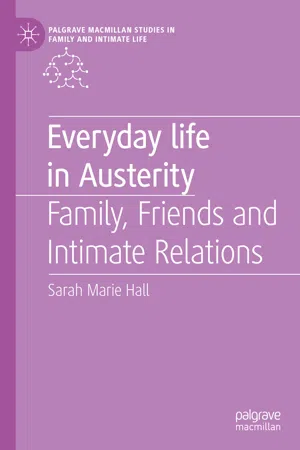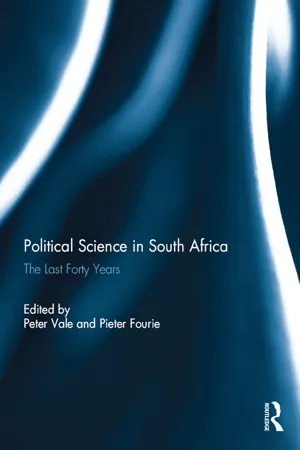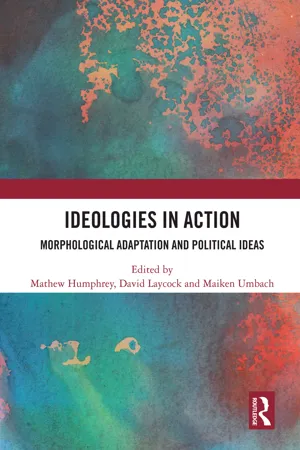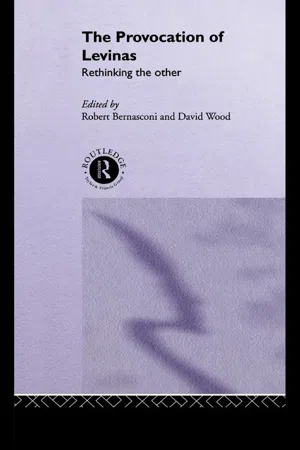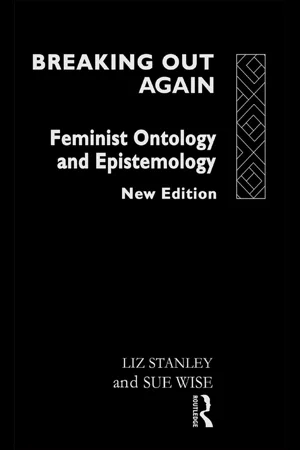Politics & International Relations
The Personal is Political
"The Personal is Political" is a feminist slogan and concept that highlights the interconnectedness of personal experiences and larger political structures. It emphasizes that individual experiences, such as relationships, family dynamics, and personal choices, are influenced by and have implications for broader social and political systems. This perspective encourages the recognition of personal experiences as important political issues and motivates individuals to engage in activism and social change.
Written by Perlego with AI-assistance
Related key terms
Related key terms
1 of 4
Related key terms
1 of 3
6 Key excerpts on "The Personal is Political"
- eBook - ePub
Prefigurative Politics
Building Tomorrow Today
- Paul Raekstad, Sofa Saio Gradin(Authors)
- 2020(Publication Date)
- Polity(Publisher)
Chapter 4 ). The latter showed that, if people are to implement a free, equal, and democratic society, they need to develop the right powers, drives, and consciousness in order to do so, which can only be done through practice. The personal-is-political argument elaborates on these ideas by showing what feminism and antiracism tell us about what kind of practice that should be. As we will see, among its main insights are, firstly, that prefigurative activists must not only create formally equal decision-making structures but must also address informal and indirect hierarchies and inequalities. Added to this, we must recognise the role that emotions and personal experiences play in our politics. Finally, we must grapple with the ways in which different forms of oppression, whether classed, racialised or gendered, intersect with each other.(a) The Personal/Political Distinction
Since the 1960s, the slogan ‘The Personal is Political’ has been painted on many a placard and poster, been printed in feminist literature and spoken of in meetings and consciousness-raising groups. The slogan represents a refusal of the false separation between ‘political’ matters on the one hand and merely ‘personal’ matters on the other, which is a distinction that has often functioned to protect men’s monopoly of power and suppress women’s voices (Heberle 2016).The personal/political distinction is often taken for granted in modern societies, where the word politics usually refers to the things that politicians do in government buildings: making decisions, debating legislation, holding meetings, giving speeches, and so on. The things those politicians, or anyone else for that matter, do in their spare time – for example, their banter during coffee breaks, who they live with, who cooks their food and looks after their children – are usually seen as non-political personal matters.This division between the political and personal has been upheld by political thinkers and actors for centuries, especially those of the liberal tradition. The distinction between the personal and the political in its current iteration in liberal societies was shaped by the same forces that shaped Europe’s transition from a feudal society to a modern one, that is, to a capitalist and colonising form of patriarchal society. It was above all championed by the emerging capitalist class, who were wealthy but did not belong to the aristocracy or monarchy, and felt a need to protect their wealth and religious freedom from state interference. The idea that the personal is distinct from the political became one of the core principles of classical liberal ideology, which holds that the nation-state is something good and necessary, but that its power must be limited to allow personal freedom. The personal/political distinction was thus originally made primarily with the state in mind: our ‘personal’ lives should be left alone by the state, taxes should be as low as possible, and state interference in matters of personal choice should be avoided. This certainly makes sense from the perspective of bourgeois white men who want to protect their private wealth from the state and treat their families and employees however they like – but as feminists have shown, it is not a very helpful distinction for those who are less privileged. - eBook - ePub
Everyday Life in Austerity
Family, Friends and Intimate Relations
- Sarah Marie Hall(Author)
- 2019(Publication Date)
- Palgrave Macmillan(Publisher)
© The Author(s) 2019 S. M. Hall Everyday Life in Austerity Palgrave Macmillan Studies in Family and Intimate Life https://doi.org/10.1007/978-3-030-17094-3_5Begin Abstract5. The Personal is Political (and Relational)
End AbstractSarah Marie Hall1(1) University of Manchester, Manchester, UKIn her essay ‘The Personal is Political’ (1970 ), Carol Hanisch argues that women’s groups who meet to discuss personal stories of oppression and discrimination should be understood not just as a form of therapy but as a politically significant act. She explains:I think we must listen to what so-called apolitical women have to say—not so we can do a better job of organising them but because together we are a mass movement. […] there are things in the consciousness of “apolitical” women (I find them very political) that are as valid as any political consciousness we think we have. (Hanisch 1970 , p. 78)These personal and relational politics form the core focus of this chapter. The phrase—‘The Personal is Political’—has since become something of a feminist mantra, sewn into banners, printed on badges, cited in speeches and echoed in paper titles (see Braithwaite 2002 ; Cahill 2007 ; Domosh 1997 ; Morris 1992 ). It was written on the cusp of an awakening and an honest reflection from within feminist organisations and groups about the diversity of experience. Critical and Feminist Race scholars especially, such as Kimberlè Crenshaw and Angela Davis, were making much-needed interventions, pointing out that there is no single understanding of being a ‘woman’, no simple categorisation, but that gender has to be understood according to socio-spatial contexts of culture, class, race, sexuality, disability and so forth (see hooks 1981 ). To homogenise these experiences—to give them one voice, one narrative—was to erase difference and associated inequalities, including within the feminist movement itself. For Hanisch (1970 - eBook - ePub
Political Science in South Africa
The Last Forty Years
- Peter Vale, Pieter Fourie(Authors)
- 2016(Publication Date)
- Routledge(Publisher)
Thus today we discuss poverty not as a development issue, but as a security issue in the so-called security-development nexus which gained currency in the 1990s under the concept of human security, championed by the United Nations Development Programme (UNDP) (see, for example, the UNDP (1994), Human Development Report). When I follow the United Nations conferences on environmental security, sustainable development, HIV/AIDS, human rights and other non-traditional ‘hard politics’ issues, with the ease of cross border communications, it seems that there is a willing global audience even for those issues that were usually left to the domestic or totally ignored. These days, the corrective rape of black lesbians in South African townships has resulted in an international outcry from thousands of citizens across the world through various online petitions, pressuring the South African government to punish the perpetrators harshly. Zakaria in The Post-American World (2009) shows that the minute to minute broadcasting of everyday international life can give one the illusion that the world today is perhaps more violent than it was decades ago. This moment of the ‘international’ seems to be a noisy place that is difficult to escape. The feminist claim that if the ‘personal is the political’, then inevitably, the ‘personal is also international’, becomes difficult to challenge, whether you call it ‘globalisation’ or ‘interdependence’. But what does all that mean? Enloe argues that accepting that the personal is the international ‘multiplies the spectators … [in IR], it especially adds women to the audience, [it however] fails to transform what is going on stage’ (Enloe 1989, 196) (emphasis added). Enloe goes on to argue that ‘the implications of a feminist understanding of international politics are thrown into sharper relief when one reads ‘the personal is international’ the other way round: the international is personal - eBook - ePub
Ideologies in Action
Morphological Adaptation and Political Ideas
- Mathew Humphrey, David Laycock, Maiken Umbach(Authors)
- 2020(Publication Date)
- Routledge(Publisher)
The political is personal: an analysis of crowd-sourced political ideas and images from a Massive Open Online Course Mathew Humphrey, Maiken Umbach and Zeynep ClulowABSTRACT
The analysis of ideology at the vernacular level requires access to peer-to-peer political discussions amongst non-specialists. It is in these discursive exchanges that political views are articulated, refined, and revised. Such exchanges are, however, difficult for the researcher to capture. Here we take c.25,000 learner comments (along with several hundred image uploads) from a Massive Open Online Course, co-produced by the University of Nottingham and the British Library, as a source of such peer-to-peer political discussions. From five topics we have selected 'Freedom', 'Justice', and 'Community' for close analysis. The idea of 'freedom' generated by far the most learner discourse, being both positively appraised and highly personalized. 'Justice' was generally seen as something to be delivered by political institutions, although accounts of injustice were frequently personalised. Accounts of 'community' often focused on the trappings of nationhood, but some comments, and many images in particular, highlighted moments of ephemeral and more personal, self-chosen communities. Overall, both comments and images show that, in their interpretation of the conceptual vocabulary of politics, people frequently frame their understanding through personal experience in a very direct manner. It is not only true that the 'personal is political', but also, for many, that the 'political is personal'.Introduction
So freedom for all is not possible without politics, but nor is complete freedom possible with politics1The quote above is from a text in political thought. It is not however, a conventional work of political theory, but rather a comment from a learner on a 'massive open online course' (MOOC) on Propaganda and Ideology in Everyday Life, - eBook - ePub
The Provocation of Levinas
Rethinking the Other
- Robert Bernasconi, David Wood, Robert Bernasconi, David Wood(Authors)
- 2002(Publication Date)
- Routledge(Publisher)
.4. The Personal is Political: Discursive Practice of the Face-to-FaceNOREEN O’CONNOR
Introduction
The slogan ‘The Personal is Political’ constitutes a challenge to traditional notions of the human as political. Human rights theories, utilitarianism, contract theories, emotivist ethico-political theories retain the notion of interpretation as fundamental, thereby continuing the Aristotelian view of the relationship of man to the world—that is, the rational animal who has a capacity for political activity. What is stressed here is the notion of the individual who is fundamentally reasonable and through the exercise of his reason can direct his actions and be responsible for them. Justice is based on a notion of equality of persons and is to be achieved by the liberation of the person to be himself. The basic, operative assumption is that of a fixed, given, human essence or nature which can, in principle, be known.The model of the human construed as fundamentally rational self-consciousness is subject to numerous reversals, refutations and critiques by contemporary European philosophers; particularly by Marxists and post-structuralists. In this chapter I shall focus on two philosophers whom I consider to offer radical contestations to foundationalist, logocentric notions of the ‘human’ and ‘society’. Both Foucault and Levinas argue against the notions of the universality of reason, the unity of truth, the teleology of reason, time as gathered into ‘presence’, the human as self-conscious subject; positively, they stress disjunctions, differences, gaps, dispersions in time and knowledge which are refractory to unification or totalization. Philosophy, since Kant, has identified itself with transcendental reflection; that is, with the theme of origin and recuperation by which, as Foucault maintains, we avoid the differences of our present. Philosophy has avoided differences by focusing all questions on man’s being and in doing this neglected the analysis of practice.1 - eBook - ePub
Breaking Out Again
Feminist Ontology and Epistemology
- Liz Stanley, Sue Wise(Authors)
- 2002(Publication Date)
- Routledge(Publisher)
personal appeal, or it means very little except as an intellectual exercise. But to what, we ask in something like despair, does ‘expert’ and abstract theorizing appeal? The answer, we are told, is that it appeals to the need to analyse in greater depth, and more sophistication, women’s liberation. But we don’t believe that such a form of analysis can do this because within it theory is provided ‘for us’ by an elite among feminists. This kind of work uses exceedingly conventional forms of analysis and constipated language, and by doing so it sets up a distinction between ‘theorists’, the elite, and the rest of us.In this chapter we examine these developments, and also some of our worries about them. We examine a number of arguments about the need to ‘get beyond’ the personal, whether into ‘real’ political action and more ‘effective’ feminism, or new theoretical developments. And then we take one example of this kind of theoretical work— ‘the family’ and its crucial role in feminist theory—and look at how our own personal experience as feminists in the gay movement and within a lesbian group demonstrate problems with current feminist thinking on this.THE PERSONAL IS THE POLITICAL—OR IS IT?
In the women’s movement of the 1960s the statement ‘the personal is the political’ was an axiom with crucial consequences, both for the ideology of the movement and also for its organization and practice. Both WLM organization and the political practice of feminism were seen to lie within the small group structure. In America these small groups contained within them a variety of activities and functions, but they also maintained a consistent style. This included a conscious lack of formal structure, emphasis on participation by everyone, a deliberate sharing of tasks, and the exclusion of men (Freeman, 1975; Jenkins and Kramer, 1978). And a very similar description of the small group in the British women’s movement, and of its use as a consciousness-raising device (Tufnell Park Group, 1972; Bruley, 1976), exists in pamphlets, articles and in a myriad of newsletters.The basic values of the small group structure aren’t confined to feminism alone. They are also those of other ‘new left’ movements, emphasizing as they do participatory democracy, equality, liberty and community. They also include the idea that hierarchy is wrong, the belief that everyone should share equally in activities and tasks, and the insistence that any kind of leadership is bad. And so when we use the word ‘organization’ in relation to the WLM, we do so taking its adoption of these values into account.
Index pages curate the most relevant extracts from our library of academic textbooks. They’ve been created using an in-house natural language model (NLM), each adding context and meaning to key research topics.
Explore more topic indexes
Explore more topic indexes
1 of 6
Explore more topic indexes
1 of 4

